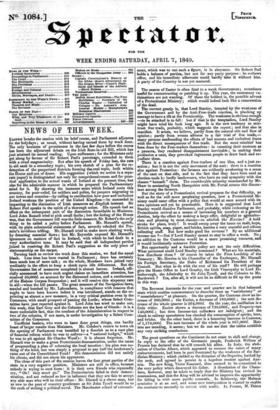The season of Easter is often fatal to a weak
Government; sometimes useful for reconstructing or patching it up. This year, the customary va- ticinations are not wanting. Of these the boldest is, the possible advent of a Protectionist Ministry; which would indeed look like a resurrection of the dead.
The current gossip is, that Lord Stanley, tempted by the weakness of the Government and by the Anti-Free-trade reaction, is plucking up courage to have a tilt at the Premiership. The weakness is obvious enough —to be attacked is to fall : but if that is the temptation, Lord Stanley might have tried his luck long ago. It is the new tendency to mis-
trust free trade, probably, which suggests the report ; and that also is manifest. It arises, we believe, partly from the natural ebb and flow of opinion ; partly from events adverse to a fair trial of free trade,— many persons confounding the effects of bad seasons and turbulent times with the direct consequences of free trade. But the most mischief has been done by the Free-traders themselves : in vaunting their nostrum as a panacea, they rendered disappointment inevitable ; in making their profession a cant, they provoked ingenuous people to draw back and re- pudiate them.
There is a reaction against Free-traders of one idea, and a just re- action ; but it is not the only movement of the sort : there is a reaction also against Protection : the farmers are evidently awakening to a sense of the cant on that side, and to the fact that they have been used as election-tools by lordly landowners, who have no real sympathy with the classes " beneath" them. The considerable minority commanded by Mr. Shaw in contesting North Hampshire with Mr. Portal attests this discon- tent among the farmers. But the story of a Protectionist revival prepares for that difficulty, as well as for the still more perplexing question, how a Protectionist Mi- nistry could enter office with a policy that would at once accord with its own opinions and yet be practicable. Here it is suggested that Lord Stanley would dissolve Parliament, and probably, while reckoning on the Protectionist revival as a means of increasing his numbers at a general election, help the effect by making a large offer, delightful to agricultu- rists and pleasing to most classes—to abolish the .Excise 1 A bold stroke for place, truly! It would sweep away the taxes on malt, hops, British spirits, soap, paper, and bricks, besides a very wasteful and odious collecting staff. But how make good the revenue ? By an additional income-tax ?—Not if Lord Stanley meant to stay in office a week. No; an addition to the Customs would be a more promising resource, and it would incidentally subserve Protection.
But opportunity and a feasible policy are not the only difficulties. What personnel could Lord Stanley command ? What are his materials, how distribute them ? Of course he takes the First Lordship of the Treasury ; Mr. Herries is his Chancellor of the Exchequer, Mr. Disraeli his Foreign Secretary, the Duke of Richmond his President of the Council. But what to do with the rest of his staff? He will perhaps give the Home Office to Lord Granby, the Irish Viceroyalty to Lord El- lenborough, the Admiralty to Sir John Tyrell, and the Colonies to Mr. Borthwick ? Yes, after all, it will not be so difficult to fill up the posts in this way.


























